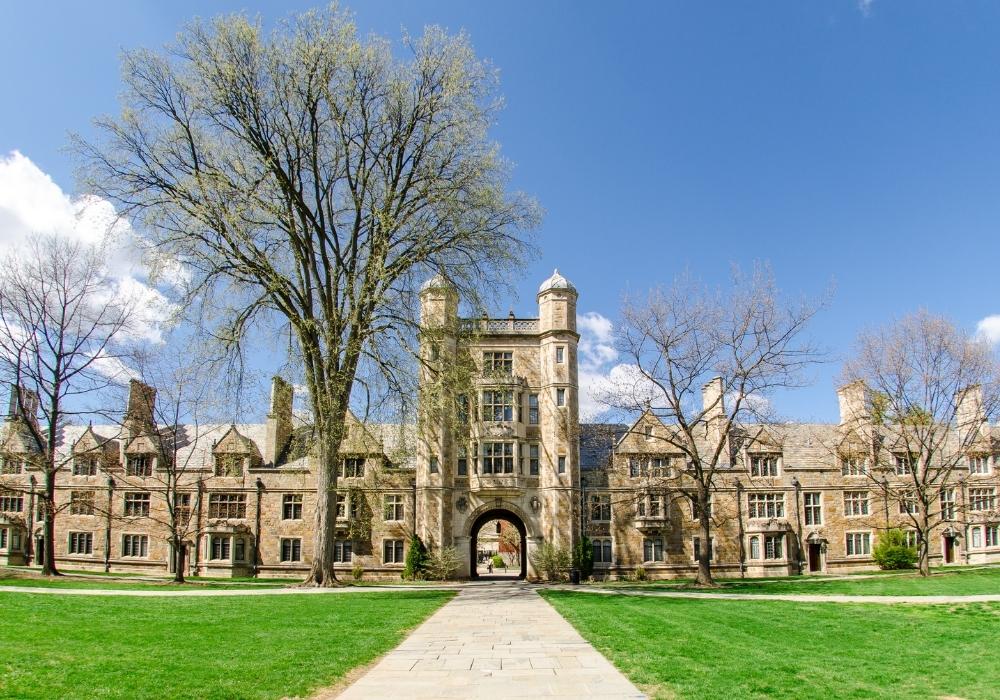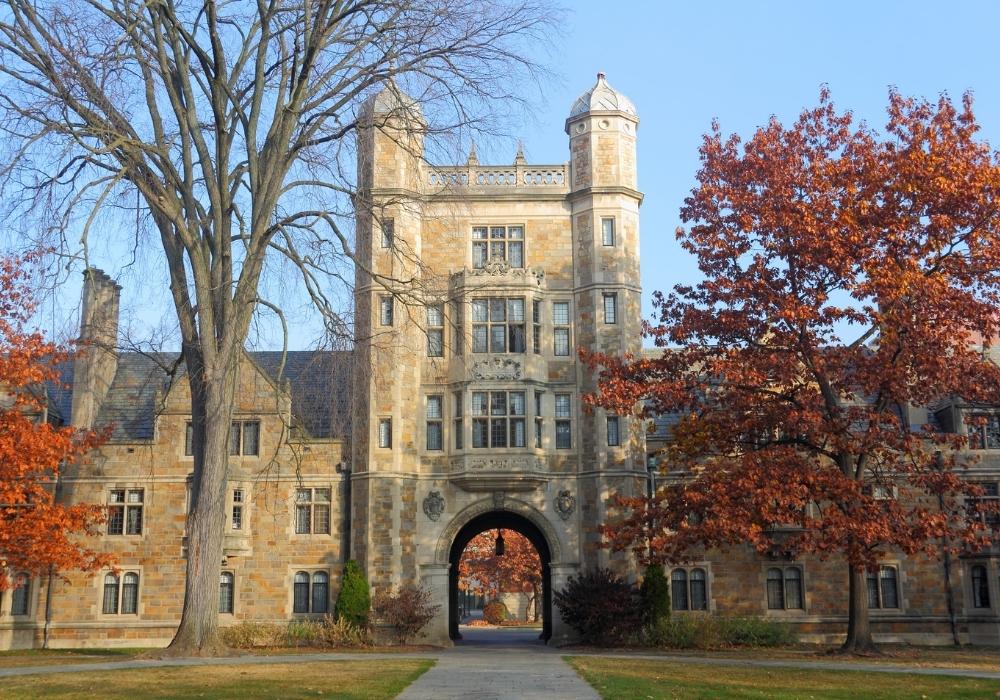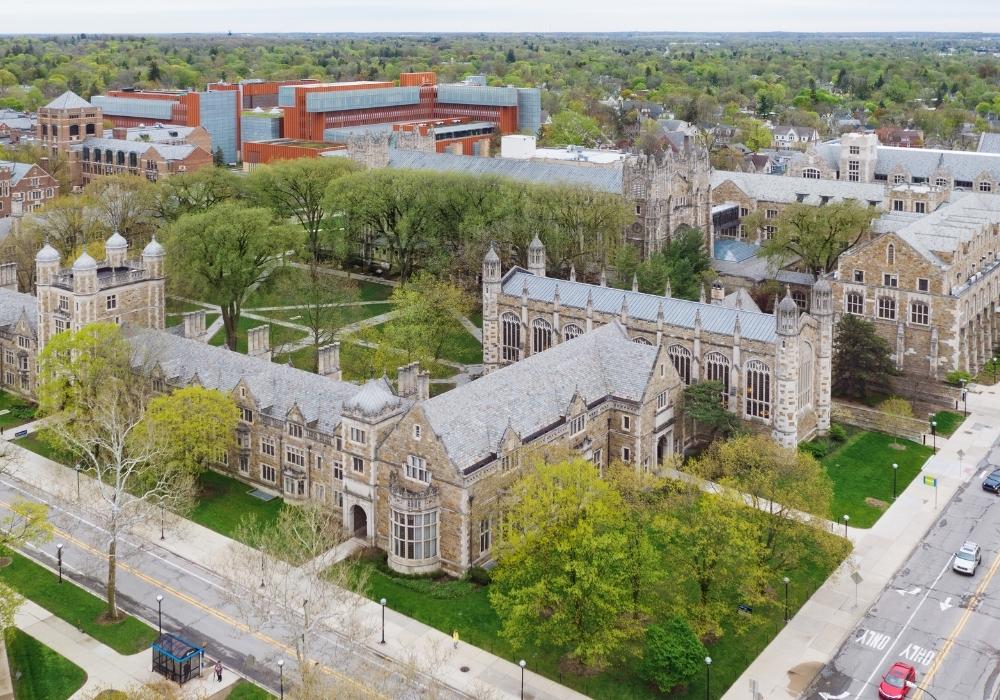The Ivy Scholars guide to the University of Michigan’s culture, admissions, and other essential information for prospective students and their families.
Location: Ann Arbor, Michigan
Mascot: Biff the Wolverine
Type: Public Research Institution
Population: 46,000 (29,800 undergrads)

Established on what was then the Western frontier of the country, the University of Michigan has become one of the premier public research universities in the nation. With a highly successful Big 10 football team (with more wins than any other), a record of academic excellence, and strong school spirit, UMich Ann Arbor is the flagship school of the Michigan system.

Year Founded: 1817
4 Year Graduation Rate: 75%
Gender Distribution: 50% female, 50% male
Acceptance Rate: 26%
Residency: 54% in state, 31% out of state, 15% international
Location Type: College Town
Schedule System: Semesters
Student/Faculty Ratio: 11:1
Average Class Size: 25
Demographics: 60% Caucasian, 16% Other, 14% Asian, 6% Hispanic, 4% Black
US News Rankings:
Independent Rankings:
Application Deadlines:
Notification Dates:
Acceptance Rates:
Average Applicant Pool: 65,000
Average Number of Applicants Accepted: 14,900
Average Number Enrolled: 6,800
Application Systems: Common App, Coalition App
Average GPA: 3.9 weighted
SAT Scores: 25th% – 1380, 75th% – 1540
ACT Scores: 25th% – 32, 75th% – 35
*Test mandatory. Writing sections are not required.
Demonstrated Interest:
UMich does consider demonstrated interest.
Recommendation Letter Policies:
One counselor recommendation and one teacher recommendation in an academic subject.
Michigan Essay Prompts:
Special Notes:
Transfer:
Admissions Criteria:
The most important factors in admissions are the rigor of high school coursework, and the student’s GPA. Also treated as important are standardized test scores, extracurriculars, application essays, recommendations, and character.
Criteria that are considered are legacy status, geographic origin, state residency, race/ethnicity, volunteer experience, and the level of an applicant’s interest.
Talent is an incredibly important consideration for the schools where it is considered relevant, those studying performance or studio arts, or architecture. For these schools, the demonstration of the student’s talent, through an audition or portfolio, accounts for half of the criteria considered when deciding on admissions.
Applicants are rated on a scale of Outstanding, Excellent, Good, Average, Poor. The following aspects are directly rated in this manner when considering an application: academic performance, educational environment, essays, recommendations, and Awards, honors, leadership, involvement, and service.
Applications are reviewed by two readers before being forwarded to the Admissions Review Committee for the final decision. Ross applicants are supposed to only be reviewed after the Committee decides, but because Ross is inundated with applicants, they review the Ross Admissions Portfolio first and tell the committee whose portfolio they like. This means that a great portfolio can drastically affect your chances of acceptance!
What is UMich Looking For?
UMich is looking for students who stand out in their extracurricular involvements, especially in a leadership capacity. The activities and extracurriculars are needed to set high achieving students apart from the crowd of their fellows. Leadership is the key character trait UMich wants to see demonstrated in an application, either through activities or a student’s supplemental essays. UMich is particularly receptive to students whose dissatisfaction with the status quo has led them to address problems to improve their community or environment.
Another key character trait the school looks for is a unique perspective, either in how a student views their intended major, or in how their background or experiences have shaped their outlook.They say “Show us how the combination of course work and related activities inspired original thinking on your part….what kind of person you are and how well you might do in a dynamic, multifaceted campus community.” This uniqueness should relate directly to Michigan; how will your approach to a major or interdisciplinary study add to the campus? How will your unique background and experiences contribute to the campus learning environment?
Michigan aims for a 50/50 split of in state vs out of state students. However, 75% of applicants come from out of state or internationally, so it’s more competitive. Thus it is not necessarily easier to get in as an in-state student, but there is less competition for the available number of slots.
You are compared to the other students who are applying to UMich from your high school; the top of those will be admitted generally. Determine how you measure up in your high school class, especially among those who may be applying to UMich.
They are looking especially for students who want to go there specifically, rather than high achieving students using UMich as a target school in case they can’t get into an Ivy League school. They want to see specifically how a student would benefit from the programs at UMich, and how their future plans for study and career fit in with what the school offers. This is especially relevant in the supplemental essay about why students want to go to UMich, as this is the essay with the most importance after the personal statement for admissions decisions. They want intellectually curious and passionate students, eager to explore their interests with the resources Michigan provides.
UMich Strategy:
Students should determine which school they are applying to, as this will affect their strategy;. Students often consider the School of Literature, Science, and the Arts (LSA) as easier to get into than the engineering program. While this appears true based on raw percentages, the truth is more complicated.
A strong student for Engineering looks different from LSA. Engineering wants students with high standardized test scores, a record of taking classes in chemistry, calculus, and physics, especially at AP level; with high scores on specialized tests in those areas, either SAT Subject or AP. LSA wants students with more varied academic talents and interests, as they have broader core requirements. Students who may be competitive for Engineering are not necessarily competitive for LSA, and vice-versa, depending on the classes they excelled in, their standardized test scores, and their extracurriculars. Students with a stronger preparation in math and science will have a much better time with Engineering, while students with more varied academic talents are better suited for LSA.
Ross accepts most of its students as first years; while it is possible to transfer in, this is becoming increasingly difficult. More than most business schools, Ross wants to see past experience and interest in business, as represented in their specific supplemental essay questions. For example, students who have tried investing in the stock market, completed internships with major companies, or who have started their own businesses. Students without these experiences will have a harder time gaining admission.
For the Ross supplement, they provide examples for what an artifact should look like, and what they liked about past examples. They also give the rubric detailing how they judge the business case discussion. Their overall guide to the portfolio gives much of the same advice: keep your answers personal, tie them to your own experience, and try to show the committee something they have not seen from your application thus far.
Transferring between colleges is difficult in most cases, but students in most of the colleges can take a second major in LSA, although this does not work the other way around. Thus, students interested in one of the subject oriented schools, such as Ross or performing arts, should apply directly to the school in question, rather than applying to LSA and then trying to transfer. Changing majors within a school is far easier than changing between schools, so that selection matters less.
Finally, students should clearly demonstrate why Michigan is the best fit for them in their essays, and display a real desire to attend if they are admitted. With a 41% yield (number of admitted students who attend), the school is eager to admit students who will actually come to the school. Doing research on the specific programs and opportunities at the school and including them in the “Why Us” essay will go a long way.
Enter your information below and submit for access to the guide.
Schools:
Core Requirements:
Courses of Study:
AP Credit Policies:

Honors Programs:
Research Availability:
Study Abroad:
Business Options:
Pre-Med Options:
Pre-Law Options:
Computer Science Options:
Additional Specialty Programs:
Programs for High Schoolers:

Motto: Arts, knowledge, truth
Mission and Values:
Residential Housing System:
There are a number of housing options on campus. There are a number of traditional dorms, and various Living Learning Communities, which combine residential life with academic interests in a smaller community. The majority of upperclassmen live off campus, in houses, apartments, or co-ops. The housing system has room for around 10,000 students.
Housing Statistics:
Campus & Surrounding Area:
Transportation:
Traditions:
Student-Run Organizations:
Sports:
Greek Life:
Nightlife:

Yearly Cost of Attendance:
Financial Aid:
Two thirds of UMich students receive some amount of financial aid. In order to apply for aid, students must fill out the Free Application for Federal Student Aid (FAFSA) and the CSS profile. The sooner these are completed, the better. Students will be considered for need based aid and awarded work-study opportunities based on these applications. Students may also attempt to transfer residency to Michigan, as in-state tuition is far lower.
Additional Financial Aid & Student Loan Information
Scholarships:
Students who complete their application for financial aid are automatically considered for scholarship opportunities. The office of financial aid has this page listing scholarship opportunities by the university, and what is required of students to be eligible for them. The school also encourages students to apply for private scholarships, which may be used to help pay tuition expenses.

Ivy Scholars is the leading educational consultant in Sugar Land, Texas, providing admissions coaching, test prep, and more to help students enroll at top tier schools.

Call us now: +1 (281) 215-5148
.
Get expert tips, admissions updates, and resources delivered straight to your inbox.


